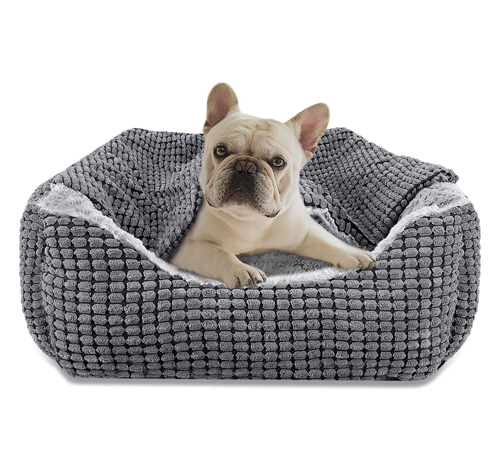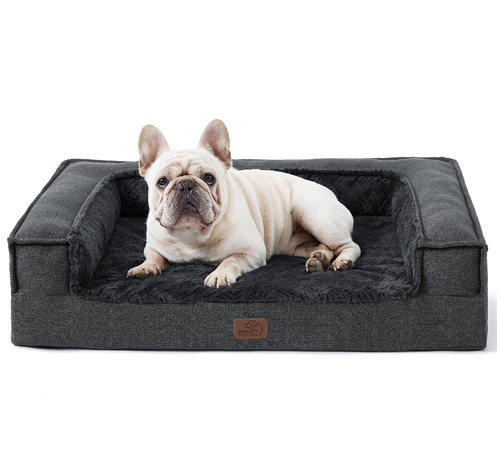In this article, I would like to take a closer look at five of the most common myths about French Bulldogs and dispel them with facts. Together we will find out what is true and what is false so that you, as a dog lover, can make an informed decision when it comes to buying this special breed. 5 myths about French Bulldogs: True or False? The ultimate fact check for dog lovers
Myth 1: French Bulldogs are aggressive
One of the most persistent preconceptions about French Bulldogs is that they are an aggressive breed. This image was probably created because of their muscular appearance and their past as fighting dogs. In reality, however, French Bulldogs are extremely friendly and gentle dogs.
Their temperament tends to be calm and composed, and they show a strong bond with their owners. Of course, as with any breed, lack of socialization or poor treatment can lead to behavioral problems. But in general, French Bulldogs are loving family dogs that are great for households with children.
To ensure that your French Bulldog develops balanced and social behavior, it is important to properly socialize and train them from puppyhood. With the right guidance and love, you will have a loyal and peaceful companion by your side.
Shop Frenchie mind toys
Myth 2: French Bulldogs need a lot of exercise – 5 myths about French Bulldogs: True or False?
Another widespread myth is that French Bulldogs have a strong urge to move and need a lot of exercise. The truth, however, is that this breed is rather cozy and relaxed.
Due to their compact size and robust build, French Bulldogs are not long-distance athletes. They are happy with moderate exercise, such as short walks or play sessions in the garden.
Of course, this doesn’t mean that they don’t need to exercise. Regular activity is important for their health and well-being. But compared to other breeds, French Bulldogs have lower energy requirements and can adapt well to a more leisurely lifestyle. 5 myths about French Bulldogs: True or False? The ultimate fact check for dog lovers
If you lead an active lifestyle and like to take your dog on long walks or jogs, another breed might be more suitable. However, for most city dwellers or families with a normal daily routine, French Bulldogs are the perfect companion.

Myth 3: French Bulldogs are difficult to train
Another myth that is often circulated about French Bulldogs is that they are difficult to train. In fact, they are very intelligent and capable of learning, as long as you take the right approach.
As with many other breeds, French Bulldogs respond best to positive reinforcement and rewards. They are extremely motivated by treats and praise and learn quickly if the training methods are interesting and varied.
The key to successfully training a French Bulldog is to be patient, consistent and loving. They do not respond well to harsh or punishing methods and can then become stubborn or fearful.
However, with the right approach and a dose of creativity, you can teach your French Bulldog a variety of tricks and behaviors. Regular training not only strengthens the bond between you and your dog, but also promotes his mental exercise and health.
Myth 4: French Bulldogs have many health problems – 5 myths about French Bulldogs: True or False? The ultimate fact check
It is true that French Bulldogs are more prone to certain health problems than other breeds due to their specific anatomy and breeding history. These include respiratory problems, heat intolerance and difficulty giving birth.
However, this does not mean that every French Bulldog will necessarily develop health problems. With responsible breeding and good care, many of these risks can be minimized.
Shop cozy Frenchie beds
If you are looking to buy a French Bulldog, it is important to find a reputable breeder who pays attention to health and good breeding lines. Regular visits to the vet, an appropriate diet and avoiding overheating or extreme exertion can also help to keep your dog healthy and fit.
5 myths about French Bulldogs: True or false? The ultimate fact check for dog lovers. While the potential health risks should not be ignored, it’s important to understand that many French Bulldogs can live long and fulfilling lives if properly cared for.
Myth 5: French Bulldogs are expensive to buy and care for
5 myths about French Bulldogs: True or false? The ultimate fact check for dog lovers. The last myth we’re going to take a closer look at is the assumption that French Bulldogs are extremely expensive to buy and care for. While it’s true that buying a puppy from a reputable breeder can be expensive, there are cheaper options.
Many animal shelters and rescue organizations always have French Bulldogs for adoption that are looking for a loving new family. By adopting a rescued dog, you can not only save money, but also give an animal a new home.
When it comes to running costs, French Bulldogs are relatively low maintenance. Their coat care is minimal thanks to their short hair, and their moderate exercise requirements often make expensive activities unnecessary.
Of course, as with any breed, there are costs for food, toys, visits to the vet and other expenses. However, with careful planning and a responsible household, these costs can be kept under control.

Fact check: What is true and what is false?
Now that we’ve taken a closer look at the five most common myths about French Bulldogs, let’s summarize what’s actually true and what’s false:
- Myth: French Bulldogs are aggressive. Wrong! This breed is generally very friendly, gentle and family-oriented as long as it is properly socialized and trained.
- Myth: French Bulldogs need a lot of exercise. Wrong! They tend to be more leisurely dogs that are happy with moderate exercise such as short walks or play sessions in the garden.
- Myth: French Bulldogs are difficult to train. Wrong! They are intelligent and capable of learning as long as you use positive reinforcement and varied training methods.
- Myth: French Bulldogs have many health problems. Partly true. They are more susceptible to certain health problems, but with responsible breeding and good care, many risks can be minimized.
- Myth: French Bulldogs are expensive to buy and care for. Partly true. Buying a puppy from a reputable breeder can be expensive, but there are also cheaper options such as adopting from a shelter. The running costs are generally manageable.
Tips for keeping and caring for a French Bulldog – 5 myths about French Bulldogs: True or False? The ultimate fact check for dog lovers
If you’ve decided to get a French Bulldog, it’s important to take the right steps to give your new family member a happy and healthy life. Here are some tips on how to keep and care for them properly:
- Socialization and training: Start early with socialization and positive training of your puppy. This promotes balanced behavior and a strong bond between you and your dog.
- Adequate exercise: French Bulldogs need moderate exercise, such as short walks or play sessions in the garden. However, do not overdo it with strenuous activities, as they can quickly overheat due to their anatomy.
- Healthy diet: Choose a high quality, balanced diet that meets the specific nutritional needs of your breed. Avoid obesity, as this can exacerbate health problems.
- Regular visits to the vet: Keep to a vaccination and worming schedule and have your dog checked regularly to identify any health problems at an early stage.
- Cooling in summer: French Bulldogs do not tolerate heat well. Make sure that your dog always has access to cooling and fresh water on hot days.
- Patience and love: Like every breed, French Bulldogs need patience, consistency and lots of love from their owners. With the right care and training, they become loyal and devoted companions.

Recommendations for buying a French Bulldog – 5 myths about French Bulldogs: True or False? The ultimate fact check for dog lovers
If you have decided to take a French Bulldog into your home, there are some important points to consider to ensure that you get a healthy and well-socialized puppy.
- Choose a reputable breeder: Research thoroughly and choose a breeder who pays attention to health, good breeding lines and ethical practices. A good breeder will ask you lots of questions to make sure you are ready for a puppy.
- Visit the breeder: Ask to see the mother dog and the puppy rearing area. Look for clean, stress-free environments and healthy, well-socialized puppies.
- Check the health tests: Ask for proof of the required health tests of the parent animals to minimize the risk of hereditary diseases.
- Consider adopting: If you are ready to give a rescued dog a home, you can also search for a French Bulldog at local shelters and rescue organizations.
- Be patient: Good breeders often have waiting lists as they limit the number of litters to protect the health of the mother dog. Be prepared to wait a little longer to get a high quality puppy.
- Plan for the costs: Expect to pay between 1,500 and 3,000 euros for a puppy from a reputable kennel. Adopting a puppy from an animal shelter costs significantly less.
By following these steps, you will increase your chances of finding a healthy and well-socialized French Bulldog puppy that is a perfect fit for your lifestyle.
Conclusion: The truth about French Bulldogs
Now that we’ve taken a closer look at the most common myths about French Bulldogs, we can say that this breed is often misrepresented. In reality, French Bulldogs are loving, gentle and adaptable dogs that can be a wonderful addition to most households. Of course, keeping any breed requires a sense of responsibility and commitment.









